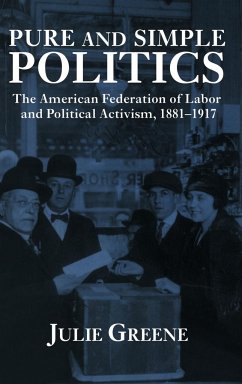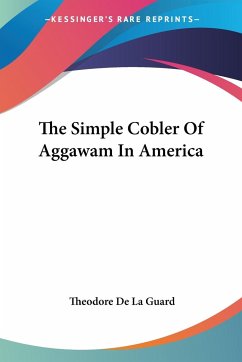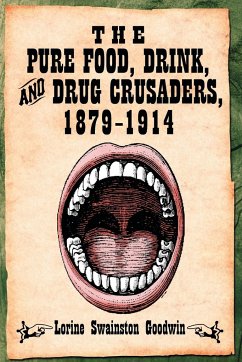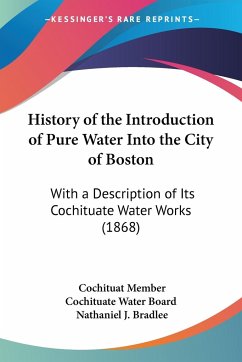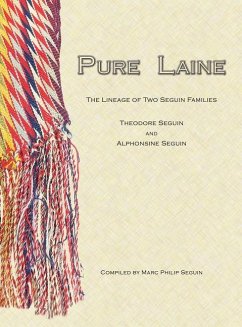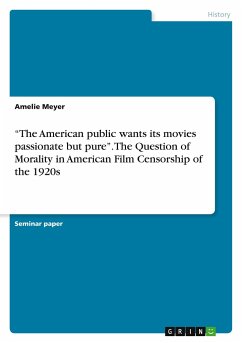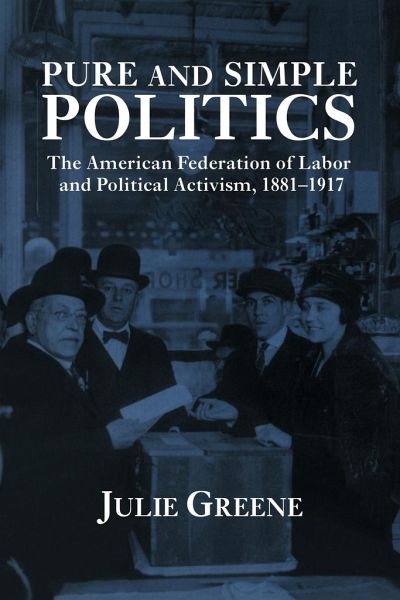
Pure and Simple Politics
The American Federation of Labor and Political Activism, 1881 1917
Versandkostenfrei!
Versandfertig in 1-2 Wochen
42,99 €
inkl. MwSt.
Weitere Ausgaben:

PAYBACK Punkte
21 °P sammeln!
This study explores the political evolution of the US labor movement, from 1881 to 1917.Scholarship on American labor politics has been dominated by the view that the American Federation of Labor, the dominant labor organization, rejected political action in favor of economic strategies. Based upon extensive research into labor and political party records, this study demonstrates that, despite the common belief, the AFL devoted great attention to political activity. The organization's main strategy, however, which Julie Greene terms 'pure and simple politics', dictated that trade unionists alo...
This study explores the political evolution of the US labor movement, from 1881 to 1917.
Scholarship on American labor politics has been dominated by the view that the American Federation of Labor, the dominant labor organization, rejected political action in favor of economic strategies. Based upon extensive research into labor and political party records, this study demonstrates that, despite the common belief, the AFL devoted great attention to political activity. The organization's main strategy, however, which Julie Greene terms 'pure and simple politics', dictated that trade unionists alone should shape American labor politics. Exploring the period from 1881 to 1917, Pure and Simple Politics focuses on the quandaries this approach generated for American trade unionists. Politics for AFL members became a highly contested terrain, as leaders attempted to implement a strategy which many rank-and-file workers rejected. Furthermore, its drive to achieve political efficacy increasingly exposed the AFL to forces beyond its control, as party politicians and other individuals began seeking to influence labor's political strategy and tactics.
Review quote:
"Pure and Simple Politics is quite simply the definitive study of AFL politics in the Gompers era. Greene's subtle and compelling narrative portrays a labor politics never completely shorn of its anti-party roots, a beleaguered federation forced to disguise its partisan political influence, and an official political ideology that remains persistently anti-statist, even as its constituency and its adopted Democratic party embrace the progressive state. This work signals new and serious attention by historians to the national political presence of organized labor in the Progressive era."
Shelton Stromquist, University of Iowa
"Julie Greene's wonderfully textured portrait of Progressive era politics transforms our understanding of the 'labor question' during the years when that issue stood near the center of American party politics. By skillfully deconstructing the AFL's 'pure and simple' electoral strategy, Greene uncovers a world of hidden strife, unexpected complexity, and lasting consequences. This is a book that every student of American political culture needs to read."
Nelson Lichtenstein, University of Virginia
"...readers will find this study valuable as a background for understanding the great CIO drives of the 1930's."
Brian O'Donnell, S.J., Michigan Historical Review
"...makes a notable contribution to the collective project of understanding America's peculiar labor politics."
Gerald Friedman, The Journal of American History
"Pure and Simple Politics defies recent historical research that look for a single cause for the AFL's political strategies. Greene's depth of research enables her to incorporate a multitude of the factors, both internal and external, that shaped labor's inability to exert the sort of influence that many scholars would have preferred. Anyone interested in obtaining a more complete picture of labor's participation in Progressive Era politics would do well to begin here."
Labor Studies Journal
Table of contents:
Acknowledgments; Introduction; Part I. The Rise of Pure and Simple Politics: 1. Building the federation; 2. The revolt against party slavery; 3. Labor's new century; Part II. The Strike at the Ballot Box: 4. A popular uprising of honest men; 5. Delivering the labor vote; 6. Party politics and workers' discontent; Part III. The Retreat from Popular Politics: 7. Quiet campaigns; 8. The making of labor's democracy; Conclusion; Index.
Scholarship on American labor politics has been dominated by the view that the American Federation of Labor, the dominant labor organization, rejected political action in favor of economic strategies. Based upon extensive research into labor and political party records, this study demonstrates that, despite the common belief, the AFL devoted great attention to political activity. The organization's main strategy, however, which Julie Greene terms 'pure and simple politics', dictated that trade unionists alone should shape American labor politics. Exploring the period from 1881 to 1917, Pure and Simple Politics focuses on the quandaries this approach generated for American trade unionists. Politics for AFL members became a highly contested terrain, as leaders attempted to implement a strategy which many rank-and-file workers rejected. Furthermore, its drive to achieve political efficacy increasingly exposed the AFL to forces beyond its control, as party politicians and other individuals began seeking to influence labor's political strategy and tactics.
Review quote:
"Pure and Simple Politics is quite simply the definitive study of AFL politics in the Gompers era. Greene's subtle and compelling narrative portrays a labor politics never completely shorn of its anti-party roots, a beleaguered federation forced to disguise its partisan political influence, and an official political ideology that remains persistently anti-statist, even as its constituency and its adopted Democratic party embrace the progressive state. This work signals new and serious attention by historians to the national political presence of organized labor in the Progressive era."
Shelton Stromquist, University of Iowa
"Julie Greene's wonderfully textured portrait of Progressive era politics transforms our understanding of the 'labor question' during the years when that issue stood near the center of American party politics. By skillfully deconstructing the AFL's 'pure and simple' electoral strategy, Greene uncovers a world of hidden strife, unexpected complexity, and lasting consequences. This is a book that every student of American political culture needs to read."
Nelson Lichtenstein, University of Virginia
"...readers will find this study valuable as a background for understanding the great CIO drives of the 1930's."
Brian O'Donnell, S.J., Michigan Historical Review
"...makes a notable contribution to the collective project of understanding America's peculiar labor politics."
Gerald Friedman, The Journal of American History
"Pure and Simple Politics defies recent historical research that look for a single cause for the AFL's political strategies. Greene's depth of research enables her to incorporate a multitude of the factors, both internal and external, that shaped labor's inability to exert the sort of influence that many scholars would have preferred. Anyone interested in obtaining a more complete picture of labor's participation in Progressive Era politics would do well to begin here."
Labor Studies Journal
Table of contents:
Acknowledgments; Introduction; Part I. The Rise of Pure and Simple Politics: 1. Building the federation; 2. The revolt against party slavery; 3. Labor's new century; Part II. The Strike at the Ballot Box: 4. A popular uprising of honest men; 5. Delivering the labor vote; 6. Party politics and workers' discontent; Part III. The Retreat from Popular Politics: 7. Quiet campaigns; 8. The making of labor's democracy; Conclusion; Index.





